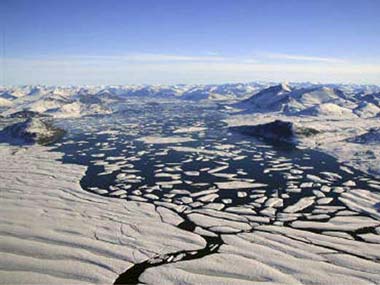London: Arctic lakes, covered with ice during the winter months, are melting one day earlier each year, according to researchers, including one of Indian origin, who monitored 13,300 lakes using satellite imagery. Scientists from the University of Southampton in the UK showed that due to warming temperatures ice is breaking earlier each spring, based on a 14-year period between 2000 and 2013. They used information on how light is reflected off the lakes, as recorded by Nasa’s Moderate Resolution Imaging Spectroradiometer (Modis) sensor, which collects a range of spectral and thermal data on a daily basis as it circles the globe on two satellites. “Previous studies have looked into small numbers of lakes to show the impact of changes in temperature on the cyclic nature of lake-ice cover,” said Jadu Dash, professor at University of Southampton. “However, ours is the first to use time-series of satellite data to monitor thousands of lakes in this way across the Arctic. It contributes to the growing range of observations showing the influence that warmer temperatures are having on the Arctic,” said Dash. [caption id=“attachment_3165218” align=“alignleft” width=“380”]  Representational image. Reuters[/caption] Researchers discovered that all five study areas in the Arctic — Alaska, Northeast Siberia, Central Siberia, Northeast Canada and Northern Europe - showed significant trends of early ice break-up in the spring, but to varying degrees. Central Siberia demonstrated the strongest trend, with ice starting to break-up an average of 1.4 days earlier each year. Northern Europe showed the lowest change of ice break-up at 0.84 days earlier per year. They found a strong relationship between decreasing ice cover and an increasingly early spring temperature rise. Researchers also examined the timing of formation of ice cover on the lakes in late autumn. Although the use of satellite images was not possible due to the short daylight period limiting valid satellite observation, observations on the ground suggest lake freezing is starting later - further shortening the ice period, although more work would be needed to confirm this. “Our findings have several implications. Changing ice cover affects the energy balance between the land and atmosphere,” said Mary Edwards from the University of Southampton. “Less ice means a longer season for lake biology, which together with warmer temperatures will affect processes such as Carbon dioxide (CO2) and Methane (CH4) emissions,” said Edwards. “Furthermore, many people use ice-covered landscapes for winter transport, and so spring and autumn travel for commercial and subsistence activities is likely to be more and more affected,” added Edwards. “This demonstrates the potential of routine satellite data for long term monitoring of physical changes on the Earth’s surface,” said Dash. “In the future, the new Sentinel series of satellites from the European Space Agency provide potential opportunities to examine these changes in greater detail,” Dash added. The study was published in the journal Scientific Reports.
Arctic lakes, covered with ice during the winter months, are melting one day earlier each year, according to researchers, including one of Indian origin, who monitored 13,300 lakes using satellite imagery.
Advertisement
End of Article


)

)
)
)
)
)
)
)
)



